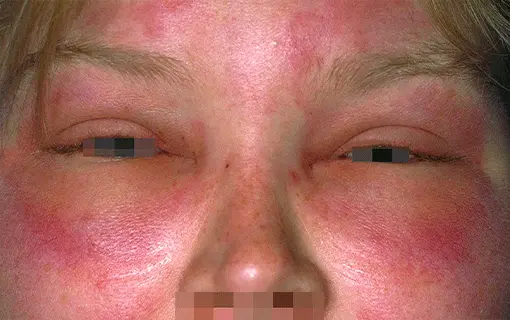Conditions / Angioedema
Angioedema

Overview
Angioedema is a condition characterized by sudden swelling beneath the skin or mucous membranes, often affecting the face, lips, tongue, throat, and sometimes the hands, feet, or genitals. This swelling is caused by a buildup of fluid and can occur as a reaction to allergens, medications, infections, or as part of a genetic disorder. In some cases, angioedema is linked to an overreaction of the immune system, while in others, it may result from a deficiency or dysfunction of certain proteins that regulate inflammation. Episodes can range from mild to severe, and when the airway is involved, it can become life-threatening. Although angioedema can resolve on its own, prompt treatment is essential to reduce swelling and prevent complications, especially in recurrent or hereditary cases.
Symptoms
The symptoms of angioedema can vary in severity, ranging from mild, temporary swelling to severe, life-threatening episodes—particularly when the airway is involved. Symptoms may appear suddenly and typically resolve within 24 to 72 hours. Depending on the underlying cause, angioedema can occur as a one-time episode or recur frequently.
Common symptoms include:
• Swelling: Sudden, pronounced swelling beneath the skin, often affecting the face, lips, eyelids, tongue, throat, hands, feet, or genitals.
• Skin tightness or discomfort: The swollen areas may feel tight, painful, or warm, although they are often not itchy.
• Redness or discoloration: The skin over the swollen area may appear red or slightly bruised.
• Abdominal symptoms: In cases involving the gastrointestinal tract, symptoms can include cramping, pain, nausea, and vomiting.
• Difficulty breathing or swallowing: Swelling in the tongue, throat, or airway can lead to life-threatening obstruction and requires immediate medical attention.
• Voice changes: Hoarseness or a muffled voice may occur if the swelling affects the throat or vocal cords.
In hereditary or chronic forms of angioedema, individuals may also experience:
• Recurrent episodes: Symptoms that come and go, often triggered by stress, trauma, infection, or certain medications.
• Lack of response to antihistamines: Especially in hereditary angioedema (HAE), where typical allergy medications are ineffective.
Angioedema may affect areas beyond the skin, including:
• Gastrointestinal tract – causing severe pain and swelling in the abdomen
• Respiratory tract – potentially leading to airway obstruction
• Urinary and reproductive organs – resulting in swelling or discomfort
When to see a doctor
Consult a doctor if you experience:
• Recurrent episodes of unexplained swelling, particularly in the face, lips, hands, feet, or around the eyes.
• Abdominal pain, cramping, or nausea that comes suddenly and is not related to food or illness.
• Swelling that does not respond to antihistamines or over-the-counter allergy medications.
• Family history of angioedema, especially if you begin experiencing similar symptoms.
• Episodes of swelling that seem to be triggered by stress, minor injuries, hormonal changes, or certain medications (like ACE inhibitors).
Seek immediate medical attention if you experience:
• Swelling of the tongue, throat, or airway that makes it difficult to breathe or swallow.
• Sudden voice changes, hoarseness, or a feeling of tightness in the throat.
• Rapid onset of facial swelling accompanied by dizziness or a drop in blood pressure.
• Any signs of anaphylaxis, including hives, rapid heartbeat, difficulty breathing, or loss of consciousness.
Causes
The exact cause of angioedema depends on the type, but it often involves a complex interaction of genetic, immune, and environmental factors. In many cases, angioedema results from an abnormal immune response, where the body releases chemicals—such as histamine or bradykinin—that cause fluid to leak into deeper layers of the skin, leading to swelling.
For some, angioedema is allergic in nature and triggered by exposure to allergens like certain foods, insect stings, or medications. In other cases, particularly hereditary angioedema (HAE), the condition is caused by a genetic mutation that affects the production or function of C1 inhibitor, a protein that helps regulate inflammation. This type does not involve histamine and typically does not respond to standard allergy treatments.
Certain medications—most notably ACE inhibitors used to treat high blood pressure—can also cause angioedema in susceptible individuals. Stress, trauma, infections, and hormonal changes can act as triggers, especially in those with a genetic predisposition.
Risk Factors
Risk factors for angioedema include:
• Family history: Individuals with a family history of angioedema—especially hereditary angioedema (HAE)—have a significantly higher risk of developing the condition due to inherited genetic mutations.
• Medications: Certain medications, particularly ACE inhibitors (used to treat high blood pressure), are a common cause of angioedema, especially in adults.
• Allergies: People with a history of severe allergic reactions or other allergic conditions like asthma or hay fever may be more prone to developing allergic angioedema.
• Age: While angioedema can affect people of all ages, hereditary forms are often present in childhood or adolescence, whereas drug-induced angioedema is more common in adults.
• Gender: Some forms of angioedema, such as hereditary angioedema, may occur more frequently or severely in females, possibly due to hormonal influences.
• Hormonal changes: In hereditary angioedema, symptoms may be triggered or worsened by hormonal fluctuations during menstruation, pregnancy, or the use of estrogen-containing medications like birth control.
• Infections and stress: Physical stress, infections, or minor trauma can trigger angioedema episodes, particularly in individuals with underlying genetic or immune-related vulnerabilities.
Complications
Angioedema increases your risk of developing:
• Airway obstruction
• Anaphylaxis
• Gastrointestinal complications: In hereditary angioedema, swelling can affect the intestinal walls, causing severe abdominal pain, vomiting, and dehydration, sometimes mimicking a surgical emergency.
• Emotional and mental health challenges
• Delayed or missed diagnosis: Angioedema can be misdiagnosed for years, delaying proper treatment and increasing the risk of complications.
• Medication side effects
• Secondary infections or trauma: Swelling in sensitive areas, such as the genitals or face, may lead to skin breakdown or infection if not properly treated or if episodes are frequent.
Medical Risk
Certain medications used to treat angioedema—such as C1 esterase inhibitors, kallikrein inhibitors, or bradykinin receptor blockers—target specific pathways involved in swelling and inflammation. While these treatments are generally well-tolerated, they may increase the risk of infections, particularly upper respiratory or gastrointestinal infections, depending on the medication used.
